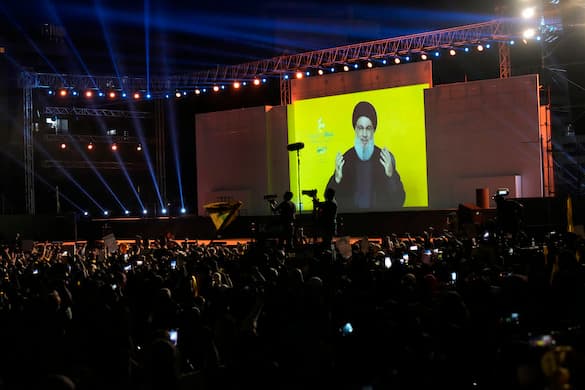Will Hezbollah Join the War? The World Will Be Watching the Speech Tomorrow of Hassan Nasrallah — Which Is Just as He Likes It
With United States Ship Gerald R. Ford standing offshore, one Lebanese economist says, ‘It’s like Mike Tyson challenging me to a heavyweight championship bout.’

Will Hezbollah officially declare war on Israel? The entire Mideast is breathlessly awaiting a Friday speech by the Lebanon-based terror group’s secretary general, Hassan Nasrallah — and he loves it.
Mr. Nasrallah, a Shiite cleric who has presided over the Iran-backed armed group for more than three decades, craves world attention. His miscalculations have already dragged Lebanon to war and destruction. Many in Lebanon fear a repeat if Hezbollah joins the war that Hamas has launched against Israel on October 7.
The Russian paramilitary group Wagner, which has close ties to President Putin, is now set to provide air defense systems to Hezbollah, American intelligence sources tell the Wall Street Journal. As Russia sides with Iran and its proxies, Washington has sent naval assets to the Mediterranean to deter Hezbollah and others from joining the war, which could spread beyond the region.
“We are determined to prevent escalation, to prevent a spread of this conflict, and we’ve taken the necessary steps to make sure that that doesn’t happen,” Secretary Blinken said Friday, as he boarded a flight to the region. There, he is expected to meet with Israeli officials on Friday and visit other capitals.
As America stations United States Ship Gerald R. Ford and its carrier group off Lebanon’s shores, Mr. Nasrallah’s gains bragging rights across the region. “It’s like Mike Tyson challenging me to a heavyweight championship bout,” a Lebanese economist, Nadim Shehadi, tells the Sun in a phone conversation from Beirut.
Mr. Nasrallah thrives on projecting power, Mr. Shehadi says. By threatening Israel and America, “he gets the whole world’s attention. In Lebanon, people joke about it, but it seems to be taken very seriously abroad.”
Since October 7, Hezbollah has provoked Israel daily with barrages of anti-tank rockets and missile shots aimed at border communities and at Israel Defense Forces bases. Civilians living in many northern towns were evacuated south as Lebanese terrorists attempted infiltrations into Israel. To date, some 50 Hezbollah operatives have been killed in such skirmishes. Yet, both sides have refrained from going full tilt in the war.
“Israel’s objective is to manage its other fronts while it focuses on Gaza,” a researcher for the Foundation for Defense of Democracies’ Long War Journal, Joe Truzman, says. Hezbollah so far has targeted the border area rather than firing deeper into Israel. The IDF is also trying to prevent an all-out war.
Since early October Mr. Nasrallah has stayed out of public view. This week, though, he posted several cryptic and menacing videos on social media. Then came the announcement for tomorrow of his first speech since October 7. It’s designed to commemorate Hezbollah’s “martyrs who died on the road to Jerusalem.”
Speculation is growing around the region that he could use the occasion to declare war on Israel. Officials of Hamas have expressed disappointment in Hezbollah’s limited support. Mostly, the Islamic Republic of Iran is urging members of its “axis of resistance” to come to Hamas’s aid.
Armed with some 150,000 missiles and drones, including high-accuracy long-range projectiles, and boasting battle-tested troops that have fought in Syria and elsewhere, Hezbollah is Iran’s most powerful proxy army. A decision to join the war with full force could wreak tremendous destruction in Israel.
Yet, “If Hezbollah makes a mistake and attacks, destruction, destruction, destruction,” the IDF chief of staff, Lieutenant General Herzy Halevy, said during a recent visit to the northern border. His threat was widely heard in Lebanon.
“Beyond the influence of Iran, the United States, and Israel on Hezbollah,” a researcher, Dvir Peri, of the Israeli think tank Alma, writes, “one must look deeply into the influence of Lebanese society and politics on the question of Hezbollah joining the war.”
While Hezbollah dominates Beirut politics, at times using assassination of undesirables to enforce its rule, it is far from deaf to Lebanese fears of destruction. “Most of the young people in Lebanon reject the possibility of war and repetition of the experience of the July 2006 war,” a Beirut-based journalist, Tony Bouloss, wrote recently.
That war was launched when Hezbollah terrorists crossed the Israeli border, killed three soldiers, and kidnapped two others. In the ensuing war, major Lebanese communities were destroyed. Had he known his aggression “would lead to such a war, would I do it? I say no, absolutely not,” Mr. Nasrallah said at the time.
Following that war, Saudi Arabia funded the rebuilding of Lebanon. This time it is unlikely to do so, Mr. Shehadi says. Mr. Nasrallah, he adds, is “the most Revolutionary Guards” among Iran’s Mideast proxies, “but his Achilles heel is his own constituency, the Shiites” in southern Lebanon.
For now, he adds, Hamas has achieved many of Iran’s goals, so Hezbollah “can gain more with no war than with war.” Yet, the ever-escalating nature of Hezbollah’s provocations could at any moment force the IDF to fight on two fronts or more.

